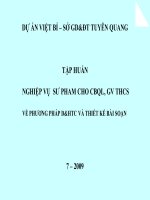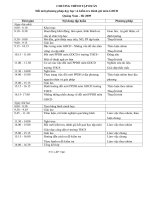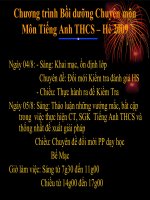chương trình tập huấn
Bạn đang xem bản rút gọn của tài liệu. Xem và tải ngay bản đầy đủ của tài liệu tại đây (679.68 KB, 35 trang )
MÔN TIẾNG ANH
2
E12
Báo cáo viên: NGUYỄN THỊ HỒNG HẠNH
READING QUIZ
I. Choose the best response for each
question. Each question has only one
correct answer.
1. Do you read every word in every
document in your native language?
A. Yes
B. No
C. Of course!
2. Are reading skills in your native
language and English similar?
A. Yes
B. No
C. They are completely different.
3. Skimming is:
A. used to understand the "gist".
B. used to find a particular piece of
information.
C. used for pleasure and general
understanding.
4. Scanning is:
A. used to understand the "gist".
B. used to find a particular piece of information.
C. used for pleasure and general understanding.
5. Extensive reading is:
A. used to understand the "gist".
B. used to find a particular piece of information.
C. used for pleasure and general understanding.
6. Intensive reading is:
A. used to get a general idea.
B. used to find specific information.
C. used when reading for pleasure.
7. Use to find a train departure time
on a schedule.
A. skimming
B. scanning
C. extensive reading
8. Reading a business brochure to get a
general idea of a business is:
A. skimming
B. scanning
C. extensive reading
9. Finding your favorite TV show is an example of:
A. skimming
B. scanning
C. extensive reading
10. You should:
A. understand each and every word when
skimming and scanning.
B. not worry about understanding each and every
word when skimming and scanning.
C. always understand each and every word when
reading anything in English.
11. Use skills when reading a
novel in your free time.
A. skimming
B. extensive reading
C. intensive reading
12. Use skills when reading a
contract you are about to sign.
A. skimming
B. extensive reading
C. intensive reading
13. Use skills when reading the latest
financial figures from your company.
A. skimming
B. extensive reading
C. intensive reading
14. You should:
A. understand each and every word when
reading an insurance claim.
B. not worry about understanding each and
every word when reading an insurance claim.
C. always understand each and every word
when reading anything in English.
15. You should:
A. understand each and every word
when reading a novel in your free time.
B. not worry about understanding each
when reading a novel in your free time.
C. look up each word you do not
understand when reading a novel in your
free time.
II. Match the ways of using newspapers in A
the classroom with the reading skills in B.
A. Reading for
gist
B. Reading for
specific
information
C. Reading for
detail
1. Matching
newspaper
headlines to
articles within a
short time limit.
II. Match the ways of using newspapers in A
the classroom with the reading skills in B.
A. Reading for
gist
B. Reading for
specific
information
C. Reading for
detail
2. Choosing the
best of three
summaries of
an article.
II. Match the ways of using newspapers in A
the classroom with the reading skills in B.
A. Reading for
gist
B. Reading for
specific
information
C. Reading for
detail
3. Asking
students to find
the answers to
particular
questions, eg.
What’s on TV
at 8pm?
II. Match the ways of using newspapers in A
the classroom with the reading skills in B.
A. Reading for
gist
B. Reading for
specific
information
C. Reading for
detail
4. Reading
articles quickly
to confirm
predictions
from headlines









